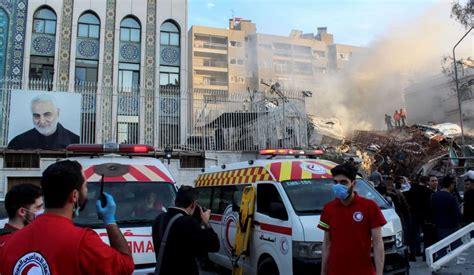
How might Iran seek to hurt Israel after general’s killing?
Iran has vowed to respond to Monday’s air strike on its consulate in Damascus – but what capacity does Iran have to hurt Israel and what form might retaliation take?
Thirteen people were killed including Brigadier General Mohammad Reza Zahedi, an important figure in the Quds force, the overseas branch of Iran’s elite Republican Guards. Israel has not said whether it was behind the attack.
Israeli Prime Minister Benjamin Netanyahu had “completely lost his mental balance”, Foreign Minister Hossein Amir-Abdollahian was quoted as saying on his ministry’s website.
The escalation was designed to show the world that Iran was a “paper tiger”, said Fawaz Gerges, professor of International Relations at London School of Economics. It also represented a significant loss to the Quds force, “which is really for coordination and arms and technology transfers to Hezbollah in Lebanon and Syria”.
Hamas’s military wing, the Qassam brigades, has said Brig Gen Zahedi had a “prominent role” in the 7 October Hamas attacks on southern Israel, which sparked the current war in Gaza that is threatening to spread. Iran has denied a role in the attack itself but backs Hamas with funding, weapons and training.
However Iran’s options for retaliation for the Damascus strike may be limited in scope and number, Mr Gerges and other experts told the BBC.
“Iran is not capable of a big confrontation with Israel given its military capabilities and economic and political situation,” said Ali Sadrzadeh an author and analyst of Middle East affairs. “But it will have to come up with a response for domestic consumption and to protect its reputation among its regional allies.”
Mr Gerges also said Iran was unlikely to retaliate directly against Israel, “even though Israel really humiliated Iran and bloodied Iran’s nose”.
Instead Iran was likely to exercise “strategic patience” because it will prioritise a more important goal: making a nuclear bomb.
“[Iran is] accumulating power, it’s enriching uranium, it’s making progress. And the big prize for Iran is not really to send 50 ballistic missiles and kill 100 Israelis, but to establish strategic deterrence, not only against the Israelis, but even against the US state.”
What about Hezbollah?
Since Israel’s war in Gaza, missile and drone attacks by Iran-backed militia in Syria, Iraq, Lebanon and Yemen against Israel interests have escalated but they seem to have limited their actions short of provoking Israel into a full-scale war.
“Even an attack against an Israeli diplomatic mission by Iran’s proxy forces seems difficult to imagine,” said Mr Sadrzadeh, although he did predict that current attacks by Iran-backed Houthi militia against ships in the Red Sea and the Gulf of Aden are “very likely to continue, especially against vessels that are somehow linked to Israel or the US”.
Hezbollah is one of the most heavily armed, non-state military forces in the world – independent estimates suggest the group has between 20,000 and 50,000 fighters, and many are well-trained and battle-hardened through their participation in the Syrian civil war.
The Iran-backed Lebanese group has an arsenal of an estimated 130,000 rockets and missiles, according to the Center for Strategic and International Studies think-tank.
Yet the experts the BBC spoke to thought it unlikely that the group would launch a major escalation against Israel.
“Hezbollah does not really want to fall into Israel’s trap because they realise Benjamin Netanyahu and his war cabinet are desperately trying to expand the war,” said Mr Gerges.
“The political future of Benjamin Netanyahu depends on the continuation of the war in Gaza and its escalation into northern fronts with Hezbollah and even with Iran itself.”
A ‘symbolic’ reaction?
Mr Sadrzadeh believes Iran is likely to show a “symbolic” reaction rather than risking a direct war with Israel.
“Iran is an expert in carrying out symbolic attacks like the one in response to the killing of its most important military commander Qasem Soleimani,” Sadrzadeh said, referring to a ballistic missile attack by Iran against an Iraqi air base where US troops were stationed – a week after the US assassinated the Iranian general in Baghdad.
Despite Iran’s promise of “severe revenge”, no US military personnel stationed at the base were killed, and there were reports that the US military had been warned in advance of the incoming missiles.
Yousof Azizi at Virginia Tech’s School of Public & International Affairs believes that there will be a struggle going on behind the scenes in Iran between those who argue that Iran should seek to establish itself as a nuclear power to deter Israeli aggression and more hawkish figures who suggest direct attacks on Israel and its military installations.
But he told the BBC that an analysis of state media interviews and key social media accounts suggested the policy of “strategic patience” was likely to prevail.
So what other avenues are open to the Iranians?
“We cannot rule out that perhaps Iran may use cyberspace as another dimension to take revenge on Israel, either to perform cyber-attacks on information technology, and to cripple, and to steal, and to leak information, or to try to distract at least operational technology,” Tal Pavel of the Israeli Institute for Cyber Policy Studies told the BBC.
“We know that during the past decade and a half, there is an ongoing clandestine cyber war between Iran and Israel. So in this case, it may be just another stage,” he said.
It will be up to Iran’s Supreme Leader Ayatollah Ali Khamenei to decide what action Tehran ultimately takes.
Source » msn.com





